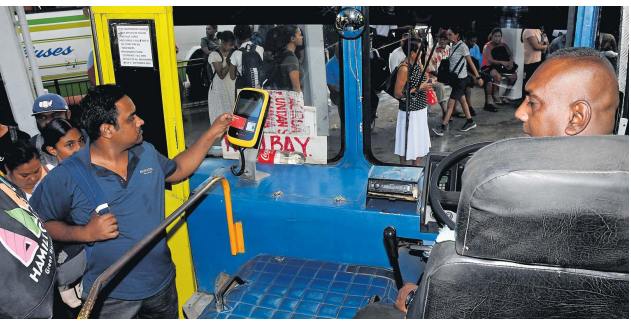The shift to e-ticketing in Fiji’s public transport system has sparked a wave of frustration, especially among rural and less digitally connected communities. While the government and the former opposition have acknowledged the system’s challenges, it is crucial that any future decision reflects the will of the people, not just the plans of policymakers or private corporations like Vodafone.
In 2023, the Minister for Infrastructure, Ro Filipe Tuisawau, stated that, “e-ticketing will continue for now, but we will be looking into improvements,” signalling the government’s intent to refine the system. His acknowledgment of the difficulties faced by passengers, especially in accessing top-up machines, shows a willingness to address practical concerns. He also indicated that there may be a future consideration of both cash and e-ticketing options, recognising that flexibility could alleviate some of the frustration caused by the system’s limitations. However, while his comments reflect a willingness to adapt, it remains unclear whether this flexibility will come soon enough to satisfy the people’s pressing concerns.
The Prime Minister, Sitiveni Rabuka, on the other hand, has been outspoken in his criticism of the current e-ticketing rollout. In 2017, in his capacity as the former leader of SODELPA, he called the situation a “disaster” for families, particularly those in rural areas, and emphasised the lack of adequate consultation before the introduction of the system. Rabuka has proposed a dual cash-and-card system, asserting that this approach would provide the flexibility needed to cater to diverse commuter needs. He further noted that “proper planning, foresight, and consultation would have prevented the chaos and disappointment suffered on the first day of e-ticketing.” His call for a “three-month trial” before full implementation aligns with the public’s demand for more time to adapt and a chance for issues to be ironed out.
Despite the government’s assurances of improvements, public sentiment remains largely negative. Many Fijians have expressed frustration with the e-ticketing system, particularly the fact that it is run entirely by Vodafone. In saying this, I am not trying to imply the other providers also start providing this service. This centralised control raises concerns about transparency and accountability. The money collected through the system passes through Vodafone’s hands, subject to tax deductions, before being disbursed to bus operators. What was initially a prepaid service has now become a postpaid system, complicating matters for passengers who are used to paying upfront. And the bus companies collecting their revenue at the end of a certain period. A better approach would be for the government to provide fuel subsidy to the providers and passengers make cash payments.
Furthermore, the system is not suitable for rural areas, where Vodafone’s network coverage is spotty at best. Many people in these areas simply cannot top up their cards or access the technology needed to use e-ticketing. Yet, the government has continued to push the system without sufficient regard for the varying needs of different communities. In urban areas, where coverage is better, many citizens own private transport and do not rely on public buses. This leaves those who most need public transport, especially rural farmers, elderly passengers, and students, facing serious barriers to travel.
In a democratic society like Fiji’s, where citizens have the right to voice their opinions, it is concerning that such a significant policy shift was introduced without adequate public consultation. As the Prime Minister rightly pointed out in 2017, the government should have conducted thorough planning, including consultations with stakeholders, before implementing the system on a large scale. The people have elected a government to represent their needs and concerns, and this must be reflected in the decisions made.
The lack of consultation is further underscored by the fact that bus fare increases and the continued deterioration of road conditions are adding to the public’s discontent. The government’s focus on e-ticketing and its associated costs, such as new machines on buses has not been matched by corresponding improvements in service. Public transport should not be a financial burden on the very people it is meant to serve.
To truly move forward, both the government and opposition must engage in a process of genuine public consultation. These should include town hall meetings, community hall meetings, village forums, and open dialogues in all divisions. Media presence should be ensured to facilitate accountability and accurate reporting. A national referendum or a formal public survey may even be considered, depending on the level of opposition or concern. These consultations will not only serve to inform government policy but also to restore trust between the public and state institutions.
Modernisation should never come at the expense of accessibility and equity. The e-ticketing system, as it stands, does not work for everyone. Moving forward, Fiji must strive to adopt a public transport payment system that reflects the values of a participatory democracy, where decisions are made not merely for the people, but with them. Only then can we claim progress that is truly meaningful and inclusive.



